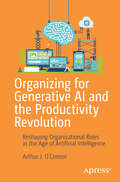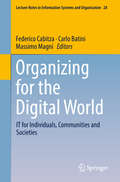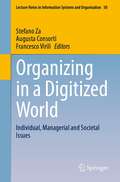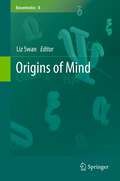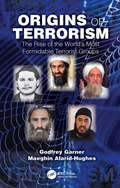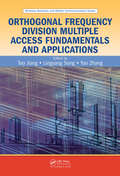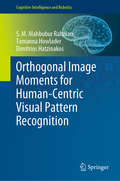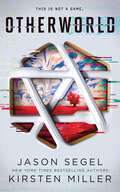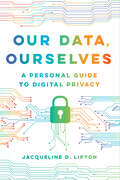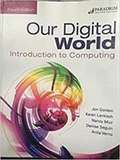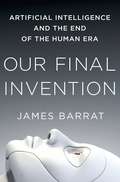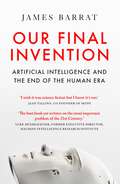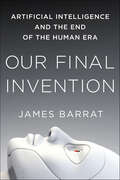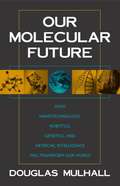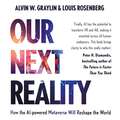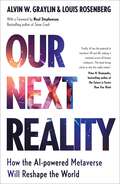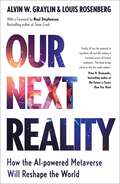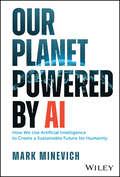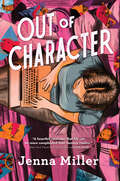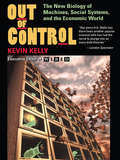- Table View
- List View
Organizing for Generative AI and the Productivity Revolution: Reshaping Organizational Roles in the Age of Artificial Intelligence
by Arthur J. O’ConnorAs leaders plan to make significant investments to harness the power of foundational models such as ChatGPT, they need to understand the changes in organizational behaviors required for the successful implementation of such systems. The size, complexity and nature of this new wave of technologies requires a refresh in roles and responsibilities in conventional IT organizations. This book reveals practical and no-nonsense guidance on how to leverage generative AI to transform your business processes and organizational structures to achieve breakthroughs in efficiency, effectiveness and competitive advantage. Written in a lively, engaging, and often humorous style, this work provides practical insights and timely survival skills for leaders with anonymous but real-world experiences and case studies. If you’re looking to understand how large language foundation models such as ChatGPT are reshaping managerial roles and organizational structures, and how they can leverage this knowledge to survive and thrive in this brave new world then Organizing for Generative AI and the Productivity Revolution is the book for you. What You Will Learn Review the key changes in current state roles and responsibilities that are required to successfully deploy generative AI systems Examine the organizational reporting structures and associated incentives that form a strong generative AI system Understand the financial, regulatory, and operational risks created by organizational behavioral issues that arise when organizations build and deploy large language models Compare the strategic differences in emerging versus traditional organizational behaviors, incentives, roles and responsibilities Who This Book Is For Executives and team leaders at enterprises large and small.
Organizing for the Digital World: It For Individuals, Communities And Societies (Lecture Notes in Information Systems and Organisation #28)
by Massimo Magni Carlo Batini Federico CabitzaThis book argues that “organizing” is a broader term than managing, as it entails understanding how people and machines interact with each other; how resources, data, goods are exchanged in complex and intertwined value chains; and how lines of action and activities can be articulated using flexible protocols and often ad-hoc processes in situated practices of use and production. The book presents a collection of research papers shedding new light on these phenomena and related practices from both academic and professional perspectives. Given the plurality of views that it offers, the book makes a relevant contribution to the understanding and appreciation of the complexity of the digital world at various levels of granularity. It focuses on how individuals, communities and the coopetitive societies of our new, global and hyperconnected world produce value and pursue their objectives and ideals in mutually dependent ways. The content of the book is based on a selection of the best papers - original double-blind peer-reviewed contributions - presented at the annual conference of the Italian chapter of the AIS, which was held in Milan, Italy in October 2017.
Organizing in a Digitized World: Individual, Managerial and Societal Issues (Lecture Notes in Information Systems and Organisation #50)
by Stefano Za Francesco Virili Augusta ConsortiIn a digitized world, organizations and individuals have to deal with several challenges. Both public and private organizations must revise their processes and create new ones to take advantage of new opportunities and respond to emerging threats. At the same time, people need to redesign their personal and professional lives to create situations or conditions conducive to achieving their goals in an ever-expanding digital environment. This book contains a collection of research contributions that address the issues that individuals, organizations, and society face when operating in a digitized world. The plurality of views offered makes this book particularly relevant to academics, businesses, and public sector organizations. It gathers a selection of the best papers (double-blind peer-reviewed) presented at the Annual Conference of the Italian Section of AIS in October 2020 in Pescara, Italy
Origins of Mind
by Liz SwanThe big question of how and why mindedness evolved necessitates collaborative, multidisciplinary investigation. Biosemiotics provides a new conceptual space that attracts a multitude of thinkers in the biological and cognitive sciences and the humanities who recognize continuity in the biosphere from the simplest to the most complex organisms, and who are united in the project of trying to account for even language and human consciousness in this comprehensive picture of life. The young interdiscipline of biosemiotics has so far by and large focused on codes, signs and sign processes in the microworld--a fact that reflects the field's strong representation in microbiology and embryology. What philosophers of mind and cognitive scientists can contribute to the growing interdiscipline are insights into how the biosemiotic weltanschauung applies to complex organisms like humans where such signs and sign processes constitute human society and culture.
Origins of Terrorism: The Rise of the World’s Most Formidable Terrorist Groups
by Godfrey Garner Maeghin Alarid-HughesOrigins of Terrorism: The Rise of the World’s Most Formidable Terrorist Groups examines the roots of Islamic terrorism, it’s history, and some of the foundational figures in prominent terrorist organizations. Throughout, the book also addresses the use of terrorism, the "hows" and "whys" of terrorists’ goals, and their modus operandi.Historically, insurgency operations have formed the basis of a number of terrorist groups—resistance to western powers, particularly the United States, and what is viewed as their unwanted interference in regional affairs. Sections are devoted to individual terror organizations, including some of the most well-known and resilient global movements—Al Qaeda, ISIS, the Taliban, and Boko Haram, among others. Coverage details where and how they originated, who the principal organizers were, how these individuals worked—or didn’t work—together. In this, the authors look at the circumstances that allowed for these leaders, and their groups’, development and success. In this, the authors expose interesting, little-known stories and facts about the specific upbringing, family life, and personal narrative around these organizations’ founders, as well as ties to other terrorist founders and organizations. For example, the relationship between individuals such as Osama bin Laden and Musab al Zarkawi (aka Ahmad al-Khalayleh)—the founder of ‘Al Qaeda in Iraq’ (AQI), which became ISIS—is examined in detail, providing readers with some of the "stories behind the stories" to understand the prominent figures and underpinnings of major terrorist organizations’ philosophies, formation, and elements that have led to their staying power.Origins of Terrorism will be a valuable resource for security and intelligence professionals, terrorism researchers, and students, providing a unique perspective to understand terrorism and terror movements in considering counterterror efforts.
Orthogonal Frequency Division Multiple Access Fundamentals and Applications
by Lingyang Song Tao Jiang Yan ZhangSupported by the expert-level advice of pioneering researchers, Orthogonal Frequency Division Multiple Access Fundamentals and Applications provides a comprehensive and accessible introduction to the foundations and applications of one of the most promising access technologies for current and future wireless networks. It includes authoritative cove
Orthogonal Image Moments for Human-Centric Visual Pattern Recognition (Cognitive Intelligence and Robotics)
by Dimitrios Hatzinakos S. M. Rahman Tamanna HowladerInstead of focusing on the mathematical properties of moments, this book is a compendium of research that demonstrates the effectiveness of orthogonal moment-based features in face recognition, expression recognition, fingerprint recognition and iris recognition. The usefulness of moments and their invariants in pattern recognition is well known. What is less well known is how orthogonal moments may be applied to specific problems in human-centric visual pattern recognition. Unlike previous books, this work highlights the fundamental issues involved in moment-based pattern recognition, from the selection of discriminative features in a high-dimensional setting, to addressing the question of how to classify a large number of patterns based on small training samples. In addition to offering new concepts that illustrate the use of statistical methods in addressing some of these issues, the book presents recent results and provides guidance on implementing the methods. Accordingly, it will be of interest to researchers and graduate students working in the broad areas of computer vision and visual pattern recognition.
Otherworld: Last Reality Series (Last Reality Ser. #1)
by Kirsten Miller Jason Segel"Full of high stakes, thrillers, and fantastic twists and turns, fans of Ready Player One are sure to love this addictive read." —BUZZFEED Welcome to real life 2.0. Are you ready to play? There are no screens. There are no controls. You don&’t just see and hear it – you taste, smell, and touch it too. In this new reality there are no rules to follow, no laws to break. You can live your best life. It&’s a game so addictive you&’ll never want it to end. Until you realize that you&’re the one being played. Step into Otherworld. Leave your body behind. The frightening future that Jason Segel and Kirsten Miller have imagined is not far away. Otherworld asks the question we'll all soon be asking: if technology can deliver everything we want, how much are we willing to pay?
Ottieni una rendita passiva con Quora e lascia il tuo lavoro: Come ottenere redditi a sette cifre online (Fare soldi online libro 1)
by Marcus PfeifferVorresti fare soldi online? Vorresti guadagnarti da vivere da casa, eppure per qualche ragione hai difficoltà e non guadagni abbastanza? Credimi, alcuni anni fa mi trovavo nella tua stessa situazione. Ho cercato a ogni angolo del world wide web e ho provato a capire come fare soldi sulla rete, ma non ho fatto un centesimo. Peggio: ho sprecato un mare di denaro in corsi, pubblicità, siti web, libri e investimenti sbagliati. Fortunatamente un giorno mi sono imbattuto in un metodo che mi ha aiutato a ottenere una rendita passiva. Però, non mi fraintendere: passiva non significa che non ci sia da lavorare per avere profitti. Significa solo che una volta fatto il lavoro i soldi arriveranno in un flusso continuo, senza una tua partecipazione attiva o particolarmente attiva. Tuttavia finché non hai raggiunto questo livello, in cui i soldi semplicemente arrivano da soli, devi lavorare duramente, e non poco. In questo libro ti mostrerò l’approccio che io ho usato per fare una fortuna. E ti prometto che, se lavorerai duramente come richiesto, arriverai a un reddito a sette cifre in pochissimo tempo.
Our Data, Ourselves: A Personal Guide to Digital Privacy
by Jacqueline D. LiptonA practical, user-friendly handbook for understanding and protecting our personal data and digital privacy. Our Data, Ourselves addresses a common and crucial question: What can we as private individuals do to protect our personal information in a digital world? In this practical handbook, legal expert Jacqueline D. Lipton guides readers through important issues involving technology, data collection, and digital privacy as they apply to our daily lives.Our Data, Ourselves covers a broad range of everyday privacy concerns with easily digestible, accessible overviews and real-world examples. Lipton explores the ways we can protect our personal data and monitor its use by corporations, the government, and others. She also explains our rights regarding sensitive personal data like health insurance records and credit scores, as well as what information retailers can legally gather, and how. Who actually owns our personal information? Can an employer legally access personal emails? What privacy rights do we have on social media? Answering these questions and more, Our Data, Ourselves provides a strategic approach to assuming control over, and ultimately protecting, our personal information.
Our Digital World: Introduction To Computing (Second Edition)
by Jon GordonThis book provides a different learning experience by connecting this course with the way you experience computing in the twenty-first century. The activities in this book involve visiting the book's Online Companion website to view videos and Flash movies, play with interactive hands-on tools, connect with fellow students and your instructor by learning how to use collaborative features such as blogs and wikis, and discover where technology is headed by reading stories from today's headlines.
Our Digital World: Introduction to Computing
by Jon Gordon Denise Seguin Nancy Muir Karen Lankisch Anita VernoNIMAC-sourced textbook
Our Digital World: Introduction to Computing
by Jon Gordon Denise Seguin Nancy Muir Karen Lankisch Anita VernoThe authors of Our Digital World have done a lot of work to make the writing in this book easy to read, to find ways to get you excited about how technology is evolving, and to make computing relevant to your work and personal lives.
Our Digital World: Introduction to Computing (4th Edition)
by Jon Gordon Denise Seguin Nancy Muir Karen Lankisch Anita VernoOur Digital World uses a contemporary approach to traditional computer concepts learning by integrating textbook resources with a variety of online activities. This new edition is a competency-based, objective-driven program that provides opportunities for students who want to explore topics. It provides you and your students:* Students can validate their new skills on each learning objective in the course and receive immediate feedback on Precheck and Recheck quizzes.* The SNAP customized Study Planner shares concept-level feedback and links to the resources that will help students succeed.* Numerous learning resources, such as videos, podcasts, online research, and hands-on activities, cater to different students' needs.
Our Final Invention: Artificial Intelligence and the End of the Human Era
by James Barrat[from inside flaps] "ARTIFICIAL INTELLIGENCE helps choose what books you buy, what movies you see, and even who you date. It puts the "smart" in your smartphone and soon it will drive your car. It makes most of the trades on Wall Street, and controls vital energy, water, and transportation infrastructure. But Artificial Intelligence can also threaten our existence. In as little as a decade, AI could match and then surpass human intelligence. Corporations and government agencies are pouring billions into achieving AI's Holy Grail--human-level intelligence. Once AI has attained it, scientists argue, it will have survival drives much like our own. We may be forced to compete with a rival more cunning, more powerful, and more alien than we can imagine. Through profiles of tech visionaries, industry watchdogs, and groundbreaking AI systems, Our Final Invention explores the perils of the heedless pursuit of advanced AI. Until now, human intelligence has had no rival. Can we coexist with beings whose intelligence dwarfs our own? And will they allow us to?"
Our Final Invention: Artificial Intelligence and the End of the Human Era
by James Barrat'I wish it was science fiction, but I know it's not.' Jaan Tallinn, co-founder of Skype'If you read just one book that makes you confront scary high-tech realities that we'll soon have no choice but to address, make it this one.' Washington Post Corporations and government agencies around the world have for years been pouring billions into achieving AI's Holy Grail - human-level intelligence. But once AI has attained it, scientists argue, it will have survival drives much like our own. We may be forced to compete with a rival more cunning, more powerful, and more alien than we can imagine.First published ten years ago, Our Final Invention predicted much of the artificial 'intelligence explosion' that is now ripping through our culture, and was named by Elon Musk as one of five books everyone should read about the future. Now with an urgent new preface, James Barrat's landmark work explores the ethics, history and future perils of the heedless pursuit of advanced AI. Until now, human intelligence has had no rival. Can we coexist with beings whose intelligence dwarfs our own? And will they allow us to?
Our Final Invention: Artificial Intelligence and the End of the Human Era
by James BarratElon Musk named Our Final Invention one of five books everyone should read about the future—a Huffington Post Definitive Tech Book of 2013.Artificial Intelligence helps choose what books you buy, what movies you see, and even who you date. It puts the “smart” in your smartphone and soon it will drive your car. It makes most of the trades on Wall Street, and controls vital energy, water, and transportation infrastructure. But Artificial Intelligence can also threaten our existence.In as little as a decade, AI could match and then surpass human intelligence. Corporations and government agencies are pouring billions into achieving AI’s Holy Grail—human-level intelligence. Once AI has attained it, scientists argue, it will have survival drives much like our own. We may be forced to compete with a rival more cunning, more powerful, and more alien than we can imagine.Through profiles of tech visionaries, industry watchdogs, and groundbreaking AI systems, Our Final Invention explores the perils of the heedless pursuit of advanced AI. Until now, human intelligence has had no rival. Can we coexist with beings whose intelligence dwarfs our own? And will they allow us to?“If you read just one book that makes you confront scary high-tech realities that we’ll soon have no choice but to address, make it this one.” —The Washington Post“Science fiction has long explored the implications of humanlike machines (think of Asimov’s I, Robot), but Barrat’s thoughtful treatment adds a dose of reality.” —Science News“A dark new book . . . lays out a strong case for why we should be at least a little worried.” —The New Yorker
Our Molecular Future: How Nanotechnology, Robotics, Genetics, and Artificial Intelligence Will Transform Our World
by Douglas MulhallWhen Mulhall sees the future, he pictures every home having a virtually cost-free desktop fabricator, not unlike an ink jet printer, that is able to create any three-dimensional object desired; he envisions being able to change the color of a car, or clothes, simply by speaking. Mulhall, who heads an environmental software consultancy, believes that nanotechnology, the ability to rearrange individual atoms, will lead to technological advances that will change every aspect of our world, including our own species. He postulates that nanotechnology will lead to such leaps forward in computing power that we will soon create robots capable of independent thought, emotional response and reproduction.
Our Next Reality: How the AI-powered Metaverse Will Reshape the World
by Alvin Wang Graylin Louis Rosenberg"Our Next Reality does a fantastic job of giving a balanced and insightful analysis to some of the most pressing questions our society will face in the near future. The material is data driven, digestible, and very actionable." RAY KURZWEIL, Author/Entrepreneur/Futurist"A wide-reaching exploration of the intersections between AI, VR and AR: it's a mind-opener, and a source of reflection on how transformative and still unknown the future of communication, personal technology and even personal privacy might become." SCOTT STEIN, Editor at Large, CNETOver the last 100 years, technology has changed our world. Over the next decade it will transform our reality.We are entering a new technological age in which artificial intelligence and immersive media will transform society at all levels, mediating our lives by altering what we see, hear, and experience. Powered by immersive eyewear and driven by interactive AI agents, this new age of computing has the potential to make our world a magical place where the boundaries between the real and the virtual, the human and the artificial, rapidly fade away. If managed well, this could unleash a new age of abundance. If managed poorly, this technological revolution could easily go astray, deeply compromising our privacy, autonomy, agency, and even our humanity.In Our Next Reality, two industry veterans provide a data-driven debate on whether the new world we're creating will be a technological utopia or an AI-powered dystopia and give guidance on how to aim for the best future we can. With a Foreword by renowned author Neal Stephenson and section contributions from industry thought-leaders such as Peter H. Diamandis, Tom Furness, Phillip Rosedale, Tony Parisi, Avi Bar Zeev and Walter Parkes, this book answers over a dozen of the most pressing questions we face as artificial intelligence and spatial computing accelerates the digitization of our world. Find out why our actions in the next decade could determine the trajectory of our species for countless millennia."For anyone who wants to use AI and XR to help build the future, read this book to help you skillfully navigate a future of unprecedented danger and promise." JASON HINER, Editor in Chief, ZDNet"Our Next Reality really is a must-read for anyone who wants to prepare for the massive AI and XR driven disruption coming our way." CHARLIE FINK, Author | Adjunct | Forbes Tech Columnist
Our Next Reality: How the AI-powered Metaverse Will Reshape the World
by Alvin Wang Graylin Louis RosenbergForeword by Neal Stephenson, bestselling author of Snow Crash Over the last 100 years, technology has changed our world. Over the next decade it will transform our reality. The planet is headed for a momentous upheaval, and we are not prepared. We are entering a new technological age in which artificial intelligence and immersive media will transform society at all levels, mediating our lives by altering what we see, hear, and experience. Powered by immersive eyewear and driven by interactive AI agents, this new age of computing has the potential to make our world a magical place where the boundaries between the real and the virtual, the human and the artificial, rapidly fade away. If managed well, this could unleash a new age of abundance. If managed poorly, this technological revolution could easily go astray, deeply compromising our privacy, autonomy, agency, and even our humanity. In Our Next Reality, two industry veterans provide a data-driven debate on whether the new world we're creating will be a technological utopia or an AI-powered dystopia and give guidance on how to aim for the best future we can. With a Foreword by renowned author Neal Stephenson and section contributions from industry thought-leaders such as Peter H. Diamandis, Tom Furness, Phillip Rosedale, Tony Parisi, Avi Bar Zeev and Walter Parkes, this book answers over a dozen of the most pressing questions we face as AI/VR/AR accelerates the digitization of our world. Find out why our actions in the next decade could determine the trajectory of our species for countless millennia.
Our Next Reality: How the AI-powered Metaverse Will Reshape the World
by Alvin Wang Graylin Louis Rosenberg"Our Next Reality does a fantastic job of giving a balanced and insightful analysis to some of the most pressing questions our society will face in the near future. The material is data driven, digestible, and very actionable." RAY KURZWEIL, Author/Entrepreneur/Futurist"A wide-reaching exploration of the intersections between AI, VR and AR: it's a mind-opener, and a source of reflection on how transformative and still unknown the future of communication, personal technology and even personal privacy might become." SCOTT STEIN, Editor at Large, CNETOver the last 100 years, technology has changed our world. Over the next decade it will transform our reality.We are entering a new technological age in which artificial intelligence and immersive media will transform society at all levels, mediating our lives by altering what we see, hear, and experience. Powered by immersive eyewear and driven by interactive AI agents, this new age of computing has the potential to make our world a magical place where the boundaries between the real and the virtual, the human and the artificial, rapidly fade away. If managed well, this could unleash a new age of abundance. If managed poorly, this technological revolution could easily go astray, deeply compromising our privacy, autonomy, agency, and even our humanity.In Our Next Reality, two industry veterans provide a data-driven debate on whether the new world we're creating will be a technological utopia or an AI-powered dystopia and give guidance on how to aim for the best future we can. With a Foreword by renowned author Neal Stephenson and section contributions from industry thought-leaders such as Peter H. Diamandis, Tom Furness, Phillip Rosedale, Tony Parisi, Avi Bar Zeev and Walter Parkes, this book answers over a dozen of the most pressing questions we face as artificial intelligence and spatial computing accelerates the digitization of our world. Find out why our actions in the next decade could determine the trajectory of our species for countless millennia."For anyone who wants to use AI and XR to help build the future, read this book to help you skillfully navigate a future of unprecedented danger and promise." JASON HINER, Editor in Chief, ZDNet"Our Next Reality really is a must-read for anyone who wants to prepare for the massive AI and XR driven disruption coming our way." CHARLIE FINK, Author | Adjunct | Forbes Tech Columnist
Our Next Reality: How the AI-powered Metaverse Will Reshape the World
by Alvin Wang Graylin Louis Rosenberg"Our Next Reality does a fantastic job of giving a balanced and insightful analysis to some of the most pressing questions our society will face in the near future. The material is data driven, digestible, and very actionable." RAY KURZWEIL, Author/Entrepreneur/Futurist"A wide-reaching exploration of the intersections between AI, VR and AR: it's a mind-opener, and a source of reflection on how transformative and still unknown the future of communication, personal technology and even personal privacy might become." SCOTT STEIN, Editor at Large, CNET"For anyone who wants to use AI and XR to help build the future, read this book to help you skillfully navigate a future of unprecedented danger and promise." JASON HINER, Editor in Chief, ZDNet"Our Next Reality really is a must-read for anyone who wants to prepare for the massive AI and XR driven disruption coming our way." CHARLIE FINK, Author | Adjunct | Forbes Tech ColumnistOver the last 100 years, technology has changed our world. Over the next decade it will transform our reality.We are entering a new technological age in which artificial intelligence and immersive media will transform society at all levels, mediating our lives by altering what we see, hear, and experience. Powered by immersive eyewear and driven by interactive AI agents, this new age of computing has the potential to make our world a magical place where the boundaries between the real and the virtual, the human and the artificial, rapidly fade away. If managed well, this could unleash a new age of abundance. If managed poorly, this technological revolution could easily go astray, deeply compromising our privacy, autonomy, agency, and even our humanity.In Our Next Reality, two industry veterans provide a data-driven debate on whether the new world we're creating will be a technological utopia or an AI-powered dystopia and give guidance on how to aim for the best future we can. With a Foreword by renowned author Neal Stephenson and section contributions from industry thought-leaders such as Peter H. Diamandis, Tom Furness, Phillip Rosedale, Tony Parisi, Avi Bar Zeev and Walter Parkes, this book answers over a dozen of the most pressing questions we face as artificial intelligence and spatial computing accelerates the digitization of our world. Find out why our actions in the next decade could determine the trajectory of our species for countless millennia.
Our Planet Powered by AI: How We Use Artificial Intelligence to Create a Sustainable Future for Humanity
by Mark MinevichA hands-on guide to evolving your company with ethical AI along with thought-provoking insights and predictions from a variety of well-known industry leaders In Our Planet Powered by AI, renowned AI strategist and pioneer Mark Minevich delivers an exciting and practical discussion of how to implement groundbreaking artificial intelligence technologies at every level of your organization. You’ll learn to create sustainable, effective competitive advantage by introducing previously unheard-of levels of adaptability, resilience, and innovation into your company. Using real-world case studies from a variety of well-known industry leaders, the author explains the strategic archetypes, technological infrastructures, and cultures of sustainability you’ll need to ensure your firm’s next-level digital transformation takes root. You’ll also discover: How AI can enable new business strategies, models, and ecosystems of innovation and growth How to develop societal impact and powerful organizational benefits with ethical AI implementations that incorporate transparency, fairness, privacy, and reliability What it means to enable all-inclusive artificial intelligence An engaging and hands-on exploration of how to take your firm to new levels of dynamism and growth, Our Planet Powered by AI will earn a place in the libraries of managers, executives, directors, and other business and technology leaders seeking to distinguish their companies in a new age of astonishing technological advancement and fierce competition.
Out of Character
by Jenna MillerDumplin’ meets Geekerella in debut author Jenna Miller’s queer, body-positive love story that explores online and offline relationships in all of their messiness.If you asked seventeen-year-old Cass Williams to describe herself, she’d happily tell you she’s fat, a lesbian, and obsessed with the Tide Wars books. What she won’t tell you—or anyone in her life—is that she’s part of an online Tide Wars roleplay community. Sure, it’s nerdy as hell, but when she’s behind the screen writing scenes as Captain Aresha, she doesn’t have to think about her mother who walked out or how unexpectedly stressful it is dating resident cool girl Taylor Cooper.But secretly retreating to her online life is starting to catch up with Cass. For one, no one in her real life knows her secret roleplay addiction is the reason her grades have taken a big hit. Also? Cass has started catching feelings for Rowan Davies, her internet bestie . . . and Taylor might be catching on.As Cass’s lies continue to build, so does her anxiety. Roleplaying used to be the one place she could escape to, but this double life and offline-online love triangle have only made things worse. Cass must decide what to do—be honest and risk losing her safe space or keep it a secret and put everything else on the line.
Out of Control: The New Biology of Machines, Social Systems and the Economic World
by Kevin KellyGood analysis of emerging understanding of biological and non-biological systems composed of thousands or millions of agents.
